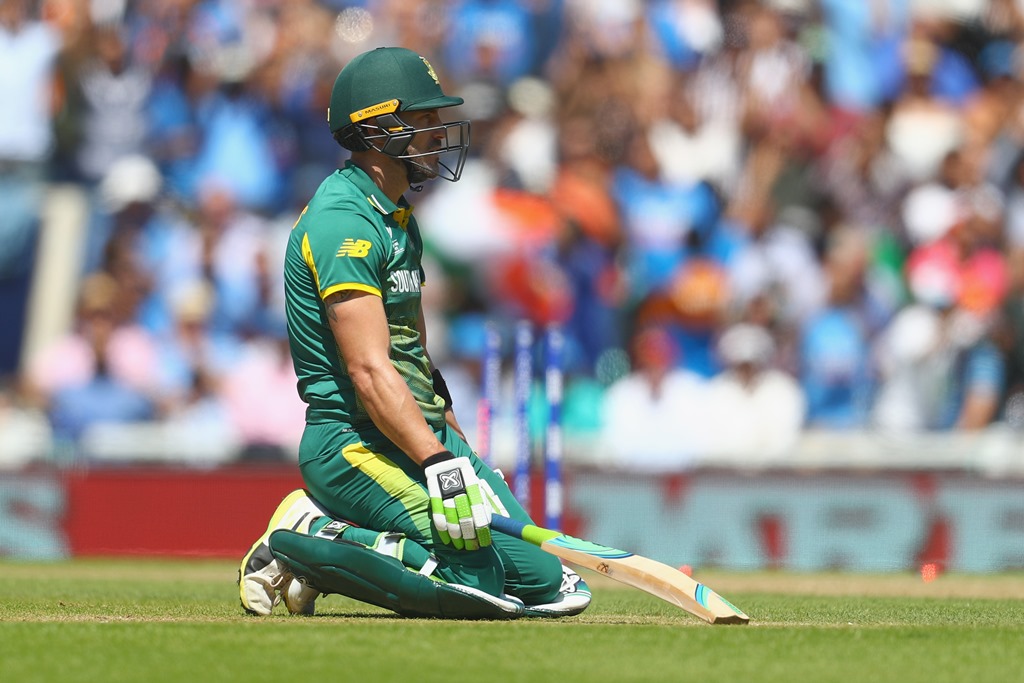Manthorp column: Proteas still can’t crack winning code

Generated by IJG JPEG Library
By Neil Manthrop
There is a big difference between not making a decision and making a bad one, or the wrong one. Some may say the difference is irrelevant if the result is always the same but learning to think and reaching a conclusion is infinitely preferable to not using the brain at all.
The problem for South Africa over the last 20 years of ICC events is that there has been a mixture of both – and more besides.
In 1996 national coach Bob Woolmer admitted to making the “worst decision of my career” when he persuaded the selection panel to omit Allan Donald in favour of a second spinner – Paul Adams – on a slow pitch in Karachi in a World Cup quarter-final against the West Indies.
Brian Lara scored a hundred and that was that.
Next came the 1999 World Cup semi-final when the red mist descended on Lance Klusener and Donald with the scores tied against Australia and with just four balls remaining.
To this day Klusener says he “cannot remember” whether they spoke while Donald insists they did. Television footage confirms they did not. They drowned in their own adrenaline.
It wasn’t until four years later when the 2003 event was played on home soil that conspiracy theorists began to believe it was a curse.
Remember, the Duckworth/Lewis method had only just been officially adopted, it was not displayed on the big screen and most players were still unfamiliar with its workings.
So when Mark Boucher calmly blocked the final ball from Muttiah Muralitharan in the Durban drizzle before the umpires took them off the field, he had secured a tie and elimination, not victory and an almost certain semi-final.
Coach Mickey Arthur was concerned that team meeting on the night before the 2007 World Cup semi-final was “strangely quiet” but assured himself that it was probably normal and that the team would be ‘up’ for the game the following morning.
But it was against Australia and they had dominated South Africa in both formats for the previous 12 years, the entire careers of the South African team. None of them knew how to win and few believed they could.
There was a ticketing malfunction at the brand new Beausejour Stadium in St Lucia which left thousands of people queueing to enter when the match started.
I walked away from my first commentary stint dazed and bewildered and bumped into a retired couple I’d met the night before.
They were from Port Elizabeth and had sold their car to raise the money to get to the Caribbean. “What’s the score?” they asked excitedly as they looked for their seats. “We’re batting,” I replied, “and we’re 27-5.”
The self-induced collapse was most aptly encapsulated by the sight of Jacques Kallis, the pillar of guaranteed calm, charging down the wicket to Glenn McGrath and edging him behind. It wasn’t until he’d retired that he really talked about it.
“Hard to explain…just tired of coming second to them, I guess, and wanting to make a statement, to dominate. It wasn’t very clever.”
Staggeringly, New Zealand bullied the Proteas out of the 2011 World Cup at the quarter-final stage by defending a low total on a slow pitch in Dhaka.
The match was theirs for the taking but they failed to seize the moment, caught off guard by their opponents and by the fine line between being calm and lacking intensity.
In 2015 AB de Villiers and Dale Steyn discussed every delivery of the final over against New Zealand and Steyn, having winked at the dugout and mouthed his favourite catchphrase: “Don’t worry, I got this…”
But they decided against yorker and bouncer at the critical moment because the risk-reward ratio was skewed by the rugby dimensions of Eden Park and decided on ‘length’. Grant Elliott, who had played age-group cricket with half the side, whacked it for six.
There have been freezes and flawed thinking galore in T20 and Champions Trophy tournaments, too, none worse than in 2013 under their head coach Gary Kirsten.
It was a glorious, sunny occasion at the Oval and the semi-final showdown with England was highly anticipated. An hour and a half into the day South Africa were 80-8.
The abiding memory of that day was Kirsten biting his lip and pausing longer than usual at the post-match Press conference when asked whether he thought his team had choked.
“Yes, I think we did,” he replied, rather calmly.
So we’ve had it all. Chokes, brain-freezes and bad decisions. Even when they did it right, it was wrong.
Full-time and part-time psychologists have been tried.
In various eras and under different coaches, players have been encouraged to embrace their failures, and those of their predecessors, and to ignore them – just enjoy themselves.
As a traumatised Graeme Smith and De Villiers said in the immediate aftermath of the last two World Cup exits: “We’ve got to win one of these things at some point and then everything will be different.”
But rest assured, it will also be business as usual when the Test series starts with South Africa fighting like
a pack of feral cats backed into a corner and refusing, ever, to know when they are beaten.
It is an extraordinary and complex phenomenon and one Cricket South Africa and the players would dearly love an answer to.
Send yours on a postcard to ‘The Wanderers, Corlett Drive, Johannesburg’ and you may be richly rewarded.